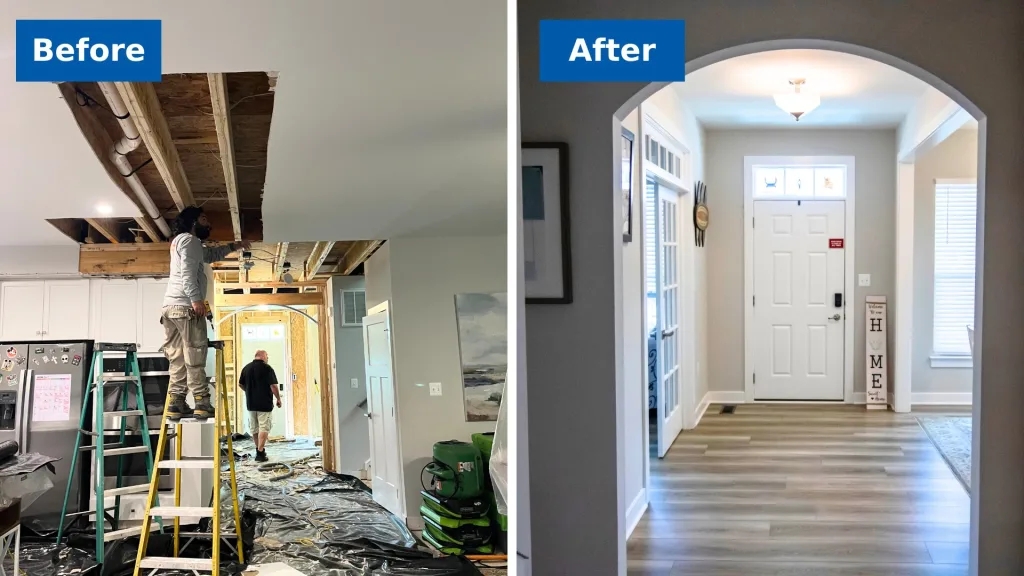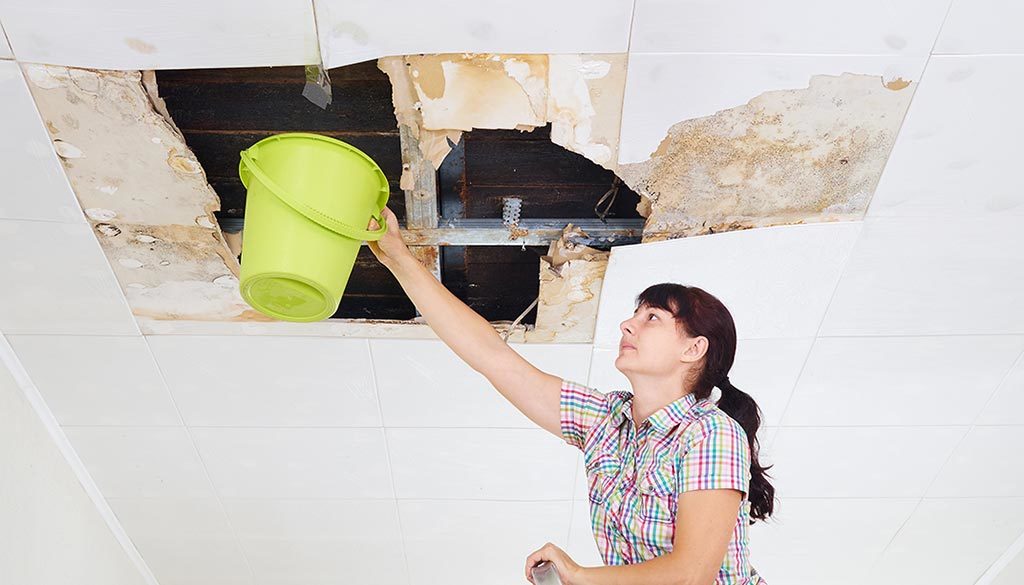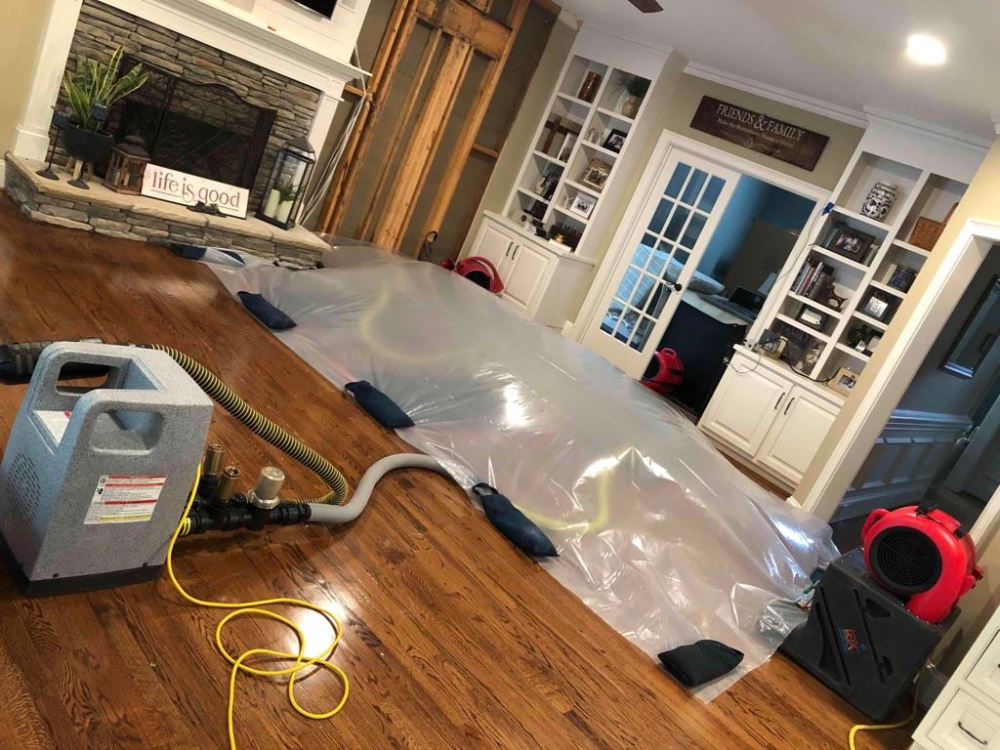Crucial Actions to Comply With for Effective Water Damages Repair in Your Home
When confronted with water damage in your home, recognizing the crucial steps for reliable repair can make all the difference. You require to examine the damage and guarantee safety and security prior to tackling the trouble. Stopping the resource of water is necessary, however it's just the beginning. There's a collection of actions you have to take to secure your home from further issues when you have actually managed that. Allow's explore what you must do next.
Analyze the Damage
When you find water damages in your house, the primary step is to examine the damages thoroughly. Start by determining the resource of the water intrusion. Look for leakages, ruptured pipes, or various other problems causing the trouble. Next, check out the impacted areas for visible indicators of damages, including mold, staining, or warping growth. Do not fail to remember to search in surprise spots like behind walls or under flooring, as water can leak into these areas unnoticed.Document the damage by taking clear photos and notes. This will certainly help you when going over the circumstance with your insurance policy service provider or remediation experts. Focus on the kind of products influenced, as different materials call for various repair techniques. Review the degree of the damage. Is it minor or comprehensive? Understanding the scope will certainly lead you in making a decision whether to manage it yourself or hire the experts for an extra considerable repair procedure.

Guarantee Safety and security
Prior to you start any remediation work, ensuring your safety and security is important. Examine the condition of your home. If the water's deep or if you notice electrical risks, don't enter the area. Switch off the electrical energy and gas supply to protect against crashes. Wear safety equipment like boots, masks, and gloves to shield yourself from contaminants or mold.It's important to stay knowledgeable about your surroundings; watch for sharp things and unsafe surface areas. If the water is from a sewer backup, treat it as harmful waste. Keep children and pets far from impacted areas to avoid exposure.Once you have actually taken these precautions, you can wage the restoration procedure. Keep in mind, your security precedes, and if you're ever before uncertain, it's ideal to consult a specialist. Taking these actions will aid ensure you're ready to take on the repair safely and effectively.
Quit the Source of Water
After guaranteeing your security, the next action is to stop the resource of water. Determine where the leakage is coming from. Maybe a ruptured pipeline, a defective appliance, or perhaps heavy rain entering via a harmed roof. If it's a pipes problem, switch off the major water system to your home to avoid further flooding. For devices, disconnect them and shut down their water valves.If the resource is outside, like rainwater, try to divert it far from your home using sandbags or other obstacles. For minor leaks, you could be able to make use of tape or a sealant briefly until an expert can repair it. Bear in mind, dealing with the resource quickly is essential to decreasing damage and stopping mold and mildew growth. As soon as you've stopped the water, you'll remain in a far better position to relocate on to the next steps in the restoration process.

Eliminate Excess Water
Act quickly to get rid of excess water, as standing water can result in more extensive damage and mold and mildew development. Collect your devices: a wet/dry vacuum cleaner, buckets, and towels. If the water is superficial, you can utilize towels to take in the wetness. For much deeper water, a wet/dry vacuum cleaner is your best option. Make certain to empty the vacuum regularly to stay clear of overflow.If the water is infected, like from a sewer back-up, wear protective equipment, including handwear covers and masks, to keep yourself secure. Once you've gotten rid of as much water as possible, look for hidden pockets of dampness in corners and under furniture, as these can nurture mold.Don' t forget to shut off electric appliances and power electrical outlets in wet areas to protect against risks. This initial step is necessary in reducing damages and setting the stage for an effective restoration process.
Dry and Dehumidify the Location
It's crucial to completely dry and dehumidify the area thoroughly once you've eliminated the excess water. Beginning by using dehumidifiers successfully to draw wetness out of the air and prevent mold and mildew development. Watch on humidity degrees to assure the room dries completely.
Remove Standing Water
To successfully deal with water damages, you need to concentrate on removing standing water as quickly as possible. Start by gathering required tools, like a wet/dry vacuum or a pump, depending upon the volume of water. click here A vacuum ought to do the trick if the water is superficial. For bigger amounts, a pump is much more effective. While working, ensure to wear protective gear to maintain on your own secure from impurities. As you get rid of the water, pay focus to concealed areas like under furniture or in corners where water might collect. Once you've gotten rid of the majority, your space will certainly start to dry out. This step is necessary, as remaining water can lead to mold and mildew growth and extra considerable damage.
Use Dehumidifiers Properly
Exactly how can you properly utilize dehumidifiers to dry and evaporate your area? Start by placing your dehumidifier in one of the most afflicted location, ideally where water damage is most serious. Ensure to close all doors and windows to create a sealed environment. Switch on the dehumidifier and established it to the ideal moisture level, usually around 30-50%. Vacant the water collection storage tank frequently, or take into consideration making use of a version with a continuous drainage choice for convenience. If feasible, utilize fans to boost airflow, aiding the dehumidifier work much more successfully. Maintain the dehumidifier running up until you're positive that the location is completely dried, avoiding mold and mildew growth and extra damages (Smoke Damage Restoration). This action is vital for effective water damage restoration
Screen Humidity Degrees
Tracking humidity levels is necessary during the drying process, as it aids assure your space stays without excess moisture. Purchase a reliable hygrometer to track humidity accurately. Ideally, you wish to preserve levels between 30% and 50%. If humidity readings increase above this variety, you might need to readjust your dehumidifiers or fans to enhance air flow. Examine the analyses frequently, particularly in locations susceptible to moisture, like cellars or washrooms. Take into consideration raising air flow or utilizing extra dehumidifiers if you notice relentless high moisture. Staying on top of these degrees not just quickens the drying out procedure yet likewise protects against mold and mildew development, ensuring your home keeps risk-free and comfortable.
Clean and Disinfect Affected Surfaces

Recover and Fix Your Home
After cleaning and sanitizing the affected locations, it's time to bring back and repair your home. Begin by evaluating the damages. Look for structural concerns, like compromised walls or floorings, and attend to any kind of necessary repair services. Replacing damaged drywall or flooring is necessary for both appearances and safety.If your furnishings or possessions were influenced, think about whether they can be salvaged or require replacement. Tidy or professionally bring back items where possible.Next, paint walls and touch up any type of areas that need interest. This not just boosts appearance however likewise protects surfaces from future water damage.Don' t fail to remember to examine your pipes and home appliances for leakages, ensuring whatever's working effectively. Consider setting up a dehumidifier to avoid future wetness problems. By taking these steps, you'll recover your home to its former magnificence and develop a more secure living setting.
Often Asked Inquiries
The Length Of Time Does Water Damage Remediation Commonly Take?
Water damages repair commonly takes anywhere from a couple of days to numerous weeks, depending on the extent of the damage (Smoke Damage Restoration). You'll wish to analyze the scenario promptly to minimize further problems and assure correct reconstruction
Will My Insurance Cover Water Damages Restoration Costs?
Your insurance coverage might cover water damages reconstruction prices, however it depends upon your policy. Examine your coverage details and call your insurance coverage agent to clarify what's included and what you need to sue.
Can I Handle Water Damages Reconstruction Myself?
You can manage water damage reconstruction yourself, however it's essential to evaluate the situation. If it's extensive, you might wish to call specialists. Constantly focus on security and guarantee you've obtained the right tools.
What Are the Indicators of Hidden Water Damage?
You could discover indicators of surprise water damage like warped walls, stuffy odors, or staining. If your floors really feel mushy or you place mold, it's time to investigate better before the scenario gets worse.
Exactly How Can I Protect Against Future Water Damage in My Home?
To prevent future water damage in your home, you need to frequently inspect plumbing, seal splits, maintain rain gutters, and warranty proper drainage. Setting up a sump pump and dampness obstacles can likewise assist keep your area completely dry. When you find water damage in your home, the very first step is to evaluate the damage thoroughly. Act quickly to remove excess water, as standing water can lead to much more comprehensive damage and mold growth. To efficiently deal with water damage, you need to focus on removing standing water as quickly as possible. As you get rid of the water, pay focus to concealed locations like under furnishings or in corners where water could collect. Water damage restoration generally takes anywhere from a few days to several weeks, depending on the level of the damages.